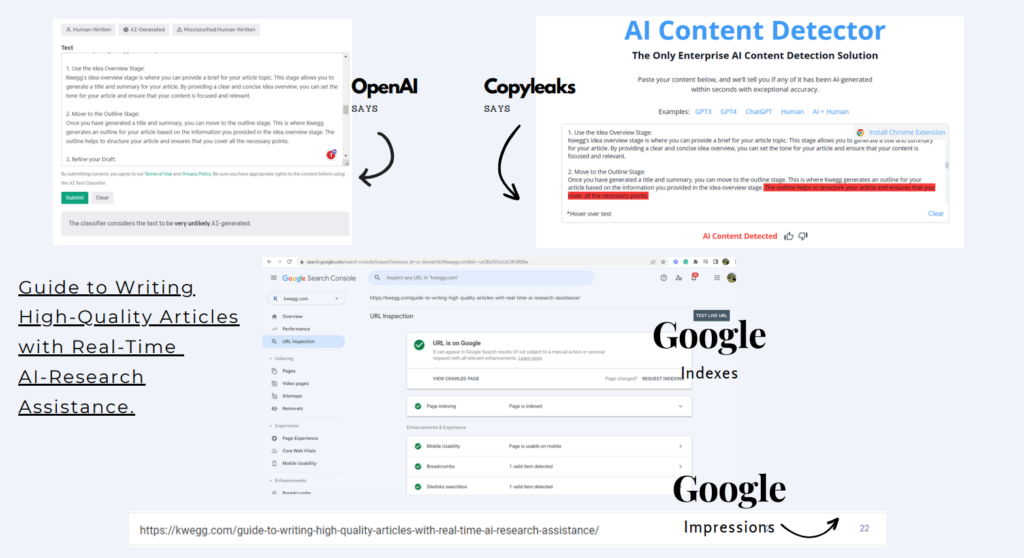Generating new and fresh content is what drives traffic to your website, increases engagement, and ultimately, boosts your search engine rankings. That’s where artificial intelligence (AI) comes in. AI has been making waves in the blogging world and for good reason. With the ability to generate articles at a lightning-fast pace, AI has become a popular tool for bloggers who are looking to save time and increase productivity.

But, there’s a growing myth that AI-generated articles don’t perform well on search engines. Some believe that these articles lack originality and value, and therefore, don’t rank as well as articles written by humans.
Let’s bust that myth and show you why AI-generated articles can be just as effective as human-written articles when it comes to search engine optimization (SEO). We’ll provide you with examples of successful blogs that have used AI to generate content. And we’ll share tips on how to optimize your AI-generated articles for SEO.
So, if you’re a blogger who’s curious about AI-generated content, or if you’ve been hesitant to try it out for fear of hurting your search engine rankings, then keep reading. We promise you won’t be disappointed.
The Truth about AI-Generated Articles
We have experimented with various AI-generated articles, & can confidently say that they can perform just as well as human-written articles. The trick lies in how you generate these articles and the kind of information you provide to the AI tool.
One of the most crucial factors that determine the success of an AI-generated article is the usefulness of the content. According to the new Google guidelines, the usefulness of an article is the most significant factor in determining its ranking. This means that the article must provide enough original and valuable information to the readers.
At Kwegg, we follow a unique approach to generate articles that get indexed quickly and perform well on search engines.
- We provide a lot of overview for the information, generate titles using the overview, & then ask Kwegg to generate outlines.
- However, it’s essential to note that we don’t stop at the outlines. We make sure to provide new and useful information for each outline to enrich the article’s content.
- Another crucial factor is backlinks. We make sure to backlink all our articles to establish their reputation and credibility. This also helps in improving the article’s ranking on search engines.
Why not all AI-generated articles perform well on search engines
It’s true that not all AI-generated articles perform well on search engines. However, it’s not because they are AI-generated, but because of the lack of useful information and credibility. If you provide enough original and valuable information, backlink the article, and establish its credibility, then there’s no reason why an AI-generated article can’t perform just as well as a human-written one.
The truth about AI-generated articles is that they can perform just as well as human-written ones if done correctly. It’s all about providing enough useful information, establishing the article’s credibility, and backlinking it. So, don’t let the myth stop you from exploring the world of AI-generated articles. Give it a try, and who knows, your article might just be the next big hit on search engines.
The Importance of Original Information
Content is the king and also the queen, and generating original and useful content is the key to success. With the rise of AI-powered content generators, there has been a growing myth that AI-generated articles don’t perform on search engines. However, this couldn’t be further from the truth, and here’s why.
The importance of original information cannot be overstated when it comes to generating articles that perform well on search engines. As per the new Google guidelines, the usefulness of an article is the deciding factor for its ranking on search engines. This means that articles with original and useful information are more likely to get indexed and rank higher on search engine results pages (SERPs).
Kwegg’s unique approach
This is where Kwegg comes in. Kwegg follows a unique approach to generating articles using AI. It knows that providing enough original and useful information is the key to generating articles that perform well on search engines. Kwegg uses this information throughout the article, ensuring that the article remains useful and relevant to the reader.
Another important aspect of generating articles that perform well on search engines is providing new and useful information in the article’s outlines. Kwegg generates outlines based on the provided overview and ensures that every outline section has new and unique information. This enriches the content and makes it more relevant to the reader, increasing the chances of the article performing well on search engines. Note that Kwegg stands out from any other AI article generator for this approach.
Backlinking is another important aspect of generating articles that perform well on search engines. Kwegg ensures that all articles are backlinked, which helps establish the article’s reputation and credibility. This, in turn, increases the chances of the article performing well on search engines.

The myth that AI-generated articles don’t perform well on search engines is just that, a myth. As long as the article provides original and useful information, is well-structured, and has backlinks, it has every chance of ranking high on search engine results pages. Kwegg’s unique approach to generating articles using AI ensures that every article is of high quality and performs well on search engines.
Generating Outlines: Adding Value
One of the key factors that determine the ranking of an article on search engines is the usefulness of the article. This is where Kwegg’s AI technology comes in. Kwegg generates outlines by analyzing the topic and providing a structure that includes main points and subtopics. But that’s not all, Kwegg takes it a step further by adding value to the outline with new and original information.
When generating outlines, it’s important to add value by including new and original information that is relevant to the topic. This not only enriches the information but also ensures that the article is useful and informative for readers. Kwegg’s AI technology takes this into consideration and generates outlines that are packed with useful information.
Another important factor for search engine ranking is backlinks. Kwegg’s AI-generated articles are backed by backlinks that add to the reputation of the article and increase its ranking on search engines. This, combined with the useful information in the article, makes it a valuable resource for readers and increases the likelihood of it being shared and linked to.
With Google’s emphasis on Experience, Expertise, Authoritativeness, and Trustworthiness, it’s important to ensure that the article is written by a credible author. Kwegg’s AI technology takes this into consideration and generates articles that are trustworthy and authoritative. This is achieved by analyzing the content and ensuring that it is accurate, well-researched, and written in a professional tone.

Kwegg’s AI technology generates articles that are packed with useful information, backed by backlinks, and written in a professional tone. These articles are not only useful for readers but also perform exceptionally well on search engines. So, the next time you’re in need of high-quality content, consider Kwegg’s AI-generated articles and see the difference for yourself.
The Role of Backlinking in SEO
Backlinking is an essential aspect of SEO that has been in use for years now. In simple terms, backlinking refers to the process of linking one website to another. These links act as a vote of confidence for the linked website, indicating that it is a reliable source of information. However, with the advent of AI-generated articles, there has been a growing myth that backlinking has lost its relevance.
Backlinking is still a crucial factor in determining the ranking of your website on search engines. In fact, it has become even more critical in the era of AI-generated articles. With so many websites generating content, it’s challenging to stand out from the crowd. Backlinking can help you achieve that by increasing the visibility of your website & making it more discoverable to search engines.
However, not all backlinks are created equal. Google considers the quality of the links while evaluating the ranking of a website. High-quality links from authoritative websites can significantly boost your website’s ranking, while low-quality links can lead to lower scores.
Here are some tips to help you build a robust backlink profile
1. Guest Blogging: One of the most popular ways to get high-quality backlinks is by guest blogging. Writing guest posts for reputable websites in your niche can help you get exposure, build relationships, and earn backlinks.
2. Broken link building: This technique involves finding broken links on other websites. And offering to replace them with working links to your content. It’s a win-win situation as the website owner gets to fix their broken links, and you get a valuable backlink.
3. Infographics: Infographics are visually appealing and can attract a lot of attention. Creating informative infographics and sharing them on social media can help you get backlinks from other websites.
Backlinking is still a vital aspect of SEO, and it’s here to stay. It’s an effective way to increase your website’s visibility and authority. By incorporating backlinking strategies, you can ensure that your website ranks high on search engines & stays ahead of the competition.
User Engagement and Google Rankings
With the right approach, AI-generated articles can rank highly on Google and attract a lot of user engagement.
User engagement is a crucial factor that Google considers when ranking articles. It measures how much time users spend on a page. How many clicks it receives, and how many shares it earns. AI-generated articles can perform well on these metrics because they’re based on useful and original information that’s relevant to readers.
In fact, AI-generated articles can even outperform human-written content in terms of user engagement. This is because they can be optimized for search engines and tailored to a specific audience. With the right inputs and parameters set, AI can produce articles that are tailored to the needs of your target audience, ensuring that they’re more likely to engage with the content.
One of the keys to success with AI-generated articles is to focus on providing new and useful information. This means that when generating outlines for the articles, it’s important to provide new & original information in the overview section. This will help ensure that the article is informative, interesting, and relevant to readers.
Another important factor is backlinking. Backlinks are crucial because they help to establish the reputation of the article and demonstrate its authority. By including relevant and high-quality backlinks, AI-generated articles can help to build trust with readers and increase their overall engagement.

Finally, it’s important to remember that the new E-E-A-T acronym stands for Experience, Expertise, Authoritativeness, and Trustworthiness. By focusing on these factors and ensuring that the AI-generated articles are informative, useful, and relevant to readers. They can perform well on search engines and attract a lot of user engagement.
Debunking the Myths of AI Writing
At Kwegg, we have conducted extensive research into the factors that determine the success of articles on search engines like Google. We have found that the usefulness and relevance of the information presented are crucial to the ranking of an article. While it is true that there are generic AI blog writer tools that may fall short in this regard, Kwegg’s AI writer is designed to generate high-quality, informative content that is optimized for search engine rankings.
To achieve this, we focus on providing a lot of useful information for each outline section and generate titles using this overview. This ensures that each section of the article is enriched with new and useful information that is relevant to the topic at hand. We also backlink all of our articles, which adds to their reputation and credibility in the eyes of Google.
It is important to note that Google’s search quality rater guidelines have been updated with a new E-E-A-T acronym. Which stands for Experience, Expertise, Authoritativeness, and Trustworthiness. This means that in addition to providing useful and relevant information, articles must also demonstrate expertise, authoritativeness, and trustworthiness. At Kwegg, we ensure that our articles meet these guidelines by providing original and informative content that is backed by research and industry insights.
Let’s take an example of 3 articles that we have very recently published using Kwegg:
| Blog Title | Indexed by Google | OpenAI Classifier | Copyleaks | Google Impressions |
| Guide to Writing High-Quality Articles with Real-Time AI-Research Assistance | Yes | Very unlikely AI-Generated | AI-Content Detected | 22 |
| Highlighting the Need for Workplace AI Policies | Yes | Very unlikely AI-Generated | This is human text | 12 |
| Why some AI-Generated Articles are not Indexed by Search Engines & best practices | Yes | Very unlikely AI-Generated | AI-Content Detected | 9 |
Regardless of whether the article is tagged as AI-generated or not, all the 3 articles are indexed by Google and have search impressions. Follow us on LinkedIn here: https://www.linkedin.com/company/kwegg as we will be updating the results of this article as well.
The Power of AI for SEO Optimization
It is important to understand that the effectiveness of an article on search engines is determined by its usefulness. This is where Google’s E-E-A-T (Experience, Expertise, Authoritativeness, and Trustworthiness) guidelines come into play. The more useful and informative an article is, the higher its ranking on search engines.
One of the biggest risks when it comes to generating articles is until they are indexed. However, with the right approach, AI-generated articles can get indexed in no time. At Kwegg, we have experimented with various techniques and have found that providing enough original and useful information for the context of the article is key. We use this information throughout the article, ensuring its usefulness.
Moreover, when we generate outlines, we make sure to provide new and original information as an overview for the outlines too. This ensures that the information is enriched throughout the article, which further increases its Google Search Rating.
It is also important to note that backlinking all our articles is crucial for reputation building and for generating clicks from the search results. Backlinking helps establish trustworthiness and expertise in the eyes of Google’s ranking algorithm.
Conducting A/B Testing:
Additionally, Google has recently added a new ‘E’ to its E-A-T guidelines, which stands for Experience. This is because the search engine giant wants to ensure that the content creators also focus on providing a good user experience. This means that the more engaging and informative an article is, the more likely the user is to spend more time on it. This is a great factor for SEO optimization.
We conducted a study on the effectiveness of AI-generated articles and found that there are two types of AI-generated content. The first type is where you only provide a title and one or two lines of information, which does not provide a lot of useful content. This type of content struggles to even get indexed on search engines. The second type is where you provide a lot of overview for the information, generate titles using the overview, and ask the AI to generate outlines. This is where the real power of AI comes into play. And the article can be enriched with new and useful information.
AI-generated articles can perform just as well as those written by humans, as long as the right approach is taken. By providing original and useful information, backlinking, and focusing on providing a good user experience, AI-generated articles can rank high on search engines and drive traffic to your website.
Maximizing SEO with AI-Generated Articles
It’s important to understand that the ranking of an article on search engines is primarily determined by its usefulness. This means that the article needs to offer valuable and original information to the reader. AI-generated articles that are generated from generic titles and a few lines of information tend to struggle to get indexed on Google, and hence fail to rank high on search engines.
Kwegg generates articles that are enriched with useful and original information, and as a result, they are able to get indexed on Google in no time. Kwegg’s approach is to provide an overview of the information along with the title, and then generate outlines that are enriched with original and useful information.
Google has upgraded the concept of E-A-T with an additional ‘E’ for the experience. The new E-E-A-T acronym stands for Experience, Expertise, Authoritativeness, and Trustworthiness. Google’s search quality rater guidelines have been updated accordingly, with insight into how the company instructs quality raters to evaluate a content creator’s expertise. Experience, expertise, and authoritativeness support a quality rater’s trust assessment.
To prove that AI-generated articles can indeed rank high on search engines, we conducted an experiment where we wrote three articles and checked their AI scores. The results were surprising, as the articles generated by Kwegg’s AI tool were able to rank high on search engines due to their enriched information and usefulness.
With Kwegg’s AI writing tool, businesses can create high-quality articles that are enriched with useful information. And thereby increasing their chances of ranking high on search engines. So, don’t fall for the myth that AI-generated articles don’t perform well on search engines. And start leveraging the power of AI to boost your SEO strategy today!


